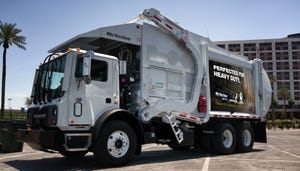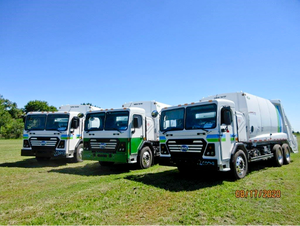Intense Competition Fuels Paper Chase
October 1, 1994
Adrienne Redd
When Pamela Retseck started her secondary paper brokerage and packing plant in 1985, she wasn't aware of other women in the country running paper recycling and packing plants. Both the paper industry and the recycling industry have been male dominated for more than a century of operations in the United States; today, the National Association of Paperstock Women (NAPW) has more than 100 members (see "Paving The Way For Women In Waste," page 48).
Retseck, the founder and president of Paper Chase in Quakertown, Pa., started her business under the wing of her father's industrial packaging business, Cherry's Packaging. In 1984, a Taiwanese buyer who worked for the company asked Retseck to help him recover 40,000 pounds of discarded computer paper to sell to Asian markets. Retseck then began buying and selling recyclable materials, paying her father 10 percent of her sales for use of his warehouse. She also paid her brother 40 percent of her sales to pick up and deliver the paper commodities she was beginning to broker.
The paper industry is evolving quickly, according to Retseck. Attitudes have changed since she has been in business. While some people were relieved when Retseck started picking up office paper in 1985, others needed the impetus of Pennsylvania Act 101, which was signed into law in 1989. As it currently stands, businesses in communities with 5,000 or more residents in the state of Pennsylvania must recycle office paper, cardboard and aluminum.
Nine years later, Paper Chase is still a comparatively small operation that Retseck calls a "recycling boutique" because it produces a clean, specialized product. The plant sells eight to 10 trailer loads per month, each containing 22 short tons.
In spite of a glut on the market in past years, Paper Chase has doubled its sales every year except 1993, when business increased by $50,000 to $270,000. Retseck's business was hurt by dips in paper prices that year and by bad weather in early 1994. For example, white ledger paper, which Retseck calls a "middle-of-the-road product," dropped so much that a load collected at the end of February 1994 might have been worth $1,000 less a week later. "Now we're almost the complete opposite, with cardboard, newspaper and mixed paper way up in price," said Retseck.
Nonetheless, the tough economic times led Retseck to re-structure her business. She has pared her staff to three part-time office workers and six full-time workers including a driver, a warehouse manager and other warehouse workers. The volume of her business is slightly lower, but she has cut costs significantly by trimming staff, employing answering and payroll services and computerizing the office.
Road To Recovery Retseck feels that the secondary paper business is now on the upswing. The paper industry has recently increased investments to retrofit manufacturing equipment in order to comply with the demand for recycled content in paper. The preliminary figure for U.S. consumption of recovered paper in 1993 is estimated at 30,023,200 short tons plus an additional 5,888,400 tons for export, according to John Easton of the American Forest and Paper Association.
"The market is very hot. Every grade is much higher than it was a year ago, especially OCC (old corrugated containers)," said Celia Monteleone Garrett of V. Monteleone & Co. Inc. in the Bronx, New York. "The market fell between 1988 and 1993 because of mandatory recycling, the Persian Gulf War and container shortages, but it has started to come back up. As a result, even garbage men have become our competitors, but they say to businesses, 'If you throw everything together we'll take it.' And then they separate it and sell it to us." Monteleone recently created a sorting line and added 14 pickers, bringing her number of employees to 50.
Retseck responds to competition and the increased demand for high grades of paper with better service to buyers and sellers. For instance, Paper Chase customizes business recycling programs and will pick up paper from the third floor if necessary. The product she sells, according to Retseck, is much cleaner than the paper collected by many trash collection companies. "You'd be amazed what we pick out of the loads," she said. "We find everything from pizza boxes to laser cartridges to microfiche. There was even a lawn mower in there once."
The full range of services offered by Paper Chase includes teaching people what to recycle and picking up 10 kinds of paper, including laser, laser-free and ground wood computer paper, super sorted office mix, white and color ledger and corrugated cardboard. The company will pick up as little as 20 boxes or as much as 14 gaylords of paper.
Recently, Retseck implemented closed-loop recycling, in which employees at the Philadelphia Inquirer use paper towels made from their recycled newsprint, and a major pharmaceuticals company, Merck, sends out its annual report on stock made from paper collected from its offices. Closed-loop promotions "add freshness and enthusiasm to an established office paper recycling program," said Retseck.
Retseck also works with purchasing agencies at a number of businesses to educate them about green buying decisions. She once felt like "a kind of glorified trash lady," but now, she said, "I'm not just at the back door anymore. The higher-ups want to learn how they can help recycle, too."
The paper industry is moving toward using more recovered paper without changing the quality or character of the finished product, said Retseck. "The industry seems to be more aware of environmental problems that were hardly talked about four or five years ago. It's very exciting," she said. "I just hope it's not a smoke screen."
You May Also Like


